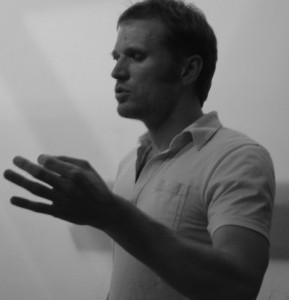Nelly Sachs. Ever hear of her? Nobel poet finds new recognition.
Friday, March 16th, 2012 Ever hear of Nelly Sachs? I hadn’t, either.
Ever hear of Nelly Sachs? I hadn’t, either.
Sachs is one of the more neglected Nobel prizewinners (she was awarded in 1966), so I was glad for the opportunity to familiarize myself with her life and work at an event last week in the Stanford Libraries’ elegant Bender Room. That, and a few new books (including the collection at left, published last year by Green Integer), should spur at least a small revival of her name. But perhaps, as is so often the case, the revival is already underway and I am confusing cause with effect.
The Berlin-born Jewish poet (1891-1970) fled with her mother after the Nazis took power, and sought refuge in Sweden, with the help of her friend (and eventually fellow Nobelist) Selma Lagerlöf. Always of fragile health, her life was marked by breakdown, paranoia, hallucinations. Her name as a poet pretty much began at 50, with her emigration. She supported herself and her mother with her translations.
The Bender Room event with champagne celebrated the publication of Aris Fioretos‘s Nelly Sachs, Flight and Metamorphosis: An Illustrated Biography. The Swedish writer Fioretos described Nelly Sachs, in the postwar years, looking up at the crossing vapor trails in the sky and seeing first scissors, then a swastika; she was sure the airplanes were spying on her. He suggested a bit of aural wordplay – “Sachs,” or “sax,” is Swedish for scissors. She continued to write even while in a mental institution.
Axel Englund of Stockholm University said she revered Friedrich Hölderlin. He quoted her line “our bodies still sound with their mutilated music” – presaging Adam Zagajewski‘s “Let Us Praise the Mutilated World,” no?
Someone read these lines of hers:
We stars, we stars
We wandering, glistening, singing dust –
Earth, our sister, has gone blind
Among the constellations of heaven –
The actor/director Andrew Utter, founder of L.A.’s Uranium Madhouse Theater read from her letters. After his reading, he kindly gave me the xeroxed pages he had read. But several days later he faxed me this one, somehow overlooked in the handful he had given me. On the page was this 1958 letter to her “Dear poet and dear person Paul Celan“:
For me it is joy enough to have a few friends, but you understand me, dear poet – I still wanted something else. I still have to accustom myself to joy, too, after so much suffering, and when the Swedish poets awarded me their newly endowed poetry prize, I couldn’t take anything in and became quite confused, that I, a foreign-language refugee, should be given so much honor.
There is and was in me, and it’s there with every breath I draw, the belief in transcendence through suffusion with pain, in the inspiritment of dust, as a vocation to which we are called. I believe in an invisible universe in which we mark out our dark accomplishment. …”
There the fading text on the faxed page disappeared in to the following, unsent page. I wonder what the rest of the letter said.
Celan replied to her of course, with his own poem, “Zürich, Zum Storchen” [Zurich, at the Stork Inn]. Here is a bit of it, in John Felstiner‘s translation:
Our talk was of your God, I spoke
against him, I let the heart
I had
hope:
for
his highest, death-rattled, his
wrangling word –Your eye looked at me, looked away,
your mouth
spoke toward the eye, I heard:We
really don’t know, you know,
we
really don’t know
what
counts.




